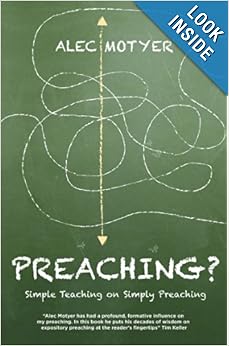
Preaching? Simply
Teaching on Simply Preaching by Alec Motyer
When a very able and competent Old Testament scholar puts
his hand at the plough of preaching, my attention stands up. Alec Motyer, former principal of Trinity
College, Bristol, is known for his careful words on the book of Isaiah and also
the Bible Speaks Today series, Old Testament portion. His new book, Preaching?, is a trove of
wisdom on the art, development, and application of sermons. In the beginning of the book, Alec notes that
preaching is much like the window dressings you see at a local store, with the
items the storekeeper most wants to sell right out front for you eye. He writes,” Bible in hand, we have a
stockroom full of the most amazing collection of goods to offer – real bargains
too!...Everything must lead to that central truth” (12). Our goods are not up for discussion but the
way we handle these goods is very important in the task of preaching. Throughout the book, Alec provides keen analysis
on the process of analyzing a text, illustrating one, and applying God’s Word
to people’s lives. One of the great gems
of the book is Alec’s style of bringing larger tasks of the preaching process
into understandable chunks.
Character sermons or lessons are great ways to see how the
shape of a story fits into an overall truth.
Alec writes, “Ever incident has its own truth to tell and every incident
could be the subject of its own sermon,….The message of the private failure of
the public man is more relevant to our times in which leading figures insist
that what is private is strictly private and a man must be judged on how he
does on the job. Not so, says the story
of Davd: the private failure,…brought the whole fabric down – private, public,
personal, domestic, individual, national” (55).
This truth is powerful in that it relates the truth that there is no
clear cut separation between public and private spheres because the attitudes
of our heart are displayed in both. For the
preacher, bringing out this point is as much a target at oneself as it is to
the congregation. Do we separate our
private life from our public life, do we have two personas?
One reminder that Alec sought to relay to his readers
concerns the manuscript and the pulpit.
He writes, “take into the pulpit with you whatever leaves you free to
handle the material fluently, and to address your hears in a ‘face-to-face’
manner” (99). There are two points here
worth commenting on: freedom in the pulpit and posture. Preaching that is carefully constructed and
meditated upon will by nature be an exercise in delivering what you have so
diligently prepared. Secondly, the
sermon is not a lecture but an exercise in connecting with God’s people. The face to face manner goes by the wayside
if we are tied to our manuscript in an overzealous manner. Alec is aware that preparation is so
important to the delivery of a good sermon because without it we look like a
person who cares not for God’s people. I
would also add that without thorough preparation we make a statement to our
people that God’s Word is not worth studying because our words are what
counts. Alec is careful throughout the
book to provide examples of word studies, sermon application, and serious
points about analysis.
I encourage all who preach or who are in preparation to be
preachers to take a look at this book.
You will be refreshed and challenged as you examine its contents.
Thanks to Christian Focus Publications for the copy of this
book in exchange for review.
Comments
Post a Comment